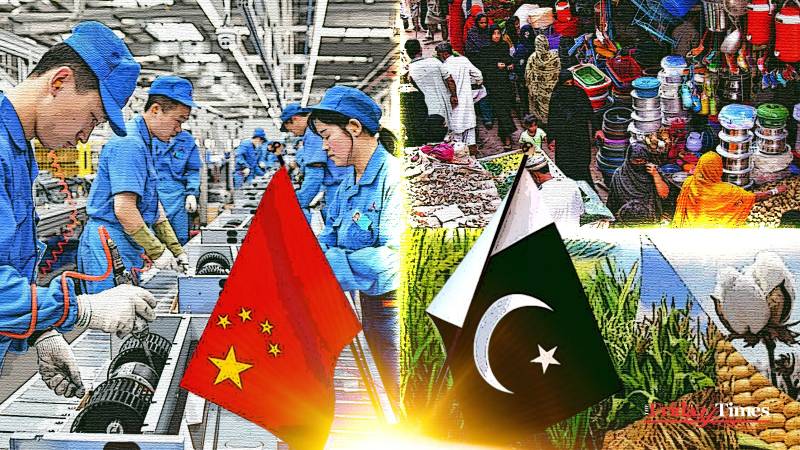
Since the late 1970s, China has grown economically, becoming the world’s second-largest economy. This growth has lifted hundreds of millions of people out of poverty and captured the attention of policymakers and economists worldwide.
China has developed a unique approach that combines strong government control, market-driven economy, and significant investment in infrastructure. This model has gained popularity among countries that are unhappy with the perceived shortcomings of Western neoliberal policies.
Prime Minister Shehbaz Sharif has pledged to copy China’s successful economic model in Pakistan. Unfortunately, politicians often respond to challenges by making bold yet unrealistic claims, presenting ambitious but impractical plans, and creating a false sense of progress. However, it's important to note that what works in one country may not work elsewhere due to their unique circumstances.
For example, China has a one-party system and centralized government, which allows for quick, efficient policy implementation. On the other hand, Pakistan has a mixed parliamentary model that combines authoritarianism and democracy, leading to divided and sometimes conflicting power structures at national and state levels. This division slows down decision-making and makes it hard to drive important changes. Because of these basic differences in how they are governed, Pakistan is unlikely to achieve the same level of success as China in terms of development.
In Pakistan, the people in power have stopped the economy from growing by using the country's systems to their own benefit.
In addition, the differences in culture between China and Pakistan could present a challenge to the Chinese development model in Pakistan. China has a long history of heavy state intervention in the economy. It values hard work and discipline. On the other hand, Pakistan has a diverse population with varying cultural norms and values. This could make it hard to establish the same level of centralized control, regimentation, and discipline that has been successful in China.
China's economic progress has come at a great cost to its people. The Communist Party of China, led by Mao Zedong and Deng Xiaoping, aimed to change China’s agrarian economy to an industrialized society after the Chinese Civil War. However, the Great Leap Forward and Cultural Revolution led to a lot of human suffering.
Deng Xiaoping made changes to the economy in the late 1970s that led to fast growth. The changes focused on foreign investment, market reforms, and entrepreneurship. He played an important role in guiding the country toward economic success. One of his famous quotes is: "It doesn't matter if a cat is black or white, as long as it catches mice." This shows his practical approach to development, prioritizing results over ideology.
Pakistan's economic strategy differs from Deng Xiaoping’s approach. The country has experienced cycles of growth and decline, often relying on IMF-led debt-driven growth. This shows a lack of clear economic direction. Instead of getting caught up in theoretical arguments, policymakers need to prioritize practical results. They should focus on achieving real-world impact rather than sticking to rigid ideology, such as pushing for rapid implementation of projects like CPEC.
Importantly, China's elite have had a big part in the fast growth of their country's economy. But this growth has also made the difference between rich and poor people even bigger. In the last 40 years, the richest 1% of people have made 17 times more money, much more than most people. On the other hand, in Pakistan, the people in power have stopped the economy from growing by using the country's systems to their own benefit. A report from the UNDP says these special benefits for the powerful people cost Pakistan over $17 billion every year.
China's large market and stable political climate make it an attractive destination for significant foreign investment crucial to its development model. In contrast, Pakistan may struggle to attract comparable investment levels due to its smaller market size and ongoing security issues.
Moreover, China’s focus on education and developing its people has been a major factor in its economic success. The country has invested significantly in educating and training its workforce, creating a highly skilled and knowledgeable labor force. This emphasis on people has been crucial for China’s economic advancement in today’s global economy.
In 2022, China's Human Development Index (HDI) score increased to 0.788, placing it in the "high" category. This is a four-place improvement from 2021 and reflects China's people-focused development approach. In contrast, in 2022, Pakistan's HDI value of 0.540 ranked it 164th out of 193 countries. This places Pakistan below both Bangladesh (129th) and India (134th), showing that human development is not a high priority.
Furthermore, China's large market and stable political climate make it an attractive destination for significant foreign investment crucial to its development model. In contrast, Pakistan may struggle to attract comparable investment levels due to its smaller market size and ongoing security issues.
The economic success of China provides important lessons for Pakistan. By investing wisely in education, infrastructure, and technology, Pakistan can achieve sustainable growth. A practical approach that balances free market forces, targeted state intervention, and customized strategies can drive progress and improve living standards in Pakistan. Ultimately, good governance, wise economic policies, and sustainable development are crucial for Pakistan's long-term prosperity.

